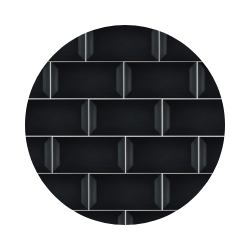In the second part of this series, we’ll be looking at the structural tests and ratings. These tests from numbers 7 to 14 on the spec sheet below provide an indication of how structurally sound a tile is. They are important because they show how tough a tile is, how resistant it is to wear and chemical attacks.
Breaking Strength
Item 7 is the Breaking strength. Breaking strength is measured in Newtons, which is a measure of force, specifically the force necessary to provide a mass of one kilogram with an acceleration of one metre per second. During the test, a hydraulic ram applies force to the tile until it breaks. This is important because furniture, vehicles and even shoe heels can produce considerable ground pressure, which especially of the tile is laid on an uneven subsurface can lead to cracking.
Rupture Modulus
Item 8 is the Rupture modulus. This test is related to the breaking strength and is also an indication of how much stress the tile will take. Essentially it measures how much the tile will bend before it breaks. It is measured in ‘Pascals’, which are one Newton per square metre, meaning that larger and longer tiles will break more easily. This measure is particularly important when specifying long wood-look plank tiles and large format tiles.
Abrasion Resistance
Item 9 Abrasion Resistance. This is a measure of Abrasion resistance i.e. how well a tile withstands scratching and scraping. Glazed tiles are measured in revolutions of an abrasive disc that the tile is subjected to before it leaves a visible mark. Unglazed tiles are measured in cubic millimetres of material removed.
Tile Hardness
Item 10 is the Hardness of the tile, which is very important. It’s a measure of scratch resistance and is tested with a set of scratch pencils tipped with various minerals from soft amber (Mohs 2) to diamond (Mohs 10).
PEI Rating
Item 11 is the tile PEI Rating. Glazed floor tiles are classified under a Porcelain Enamel Institute (PEI) rating for the suitability of fixing in a particular location. This is a useful measure because it is calculated by combining a number of tests including hardness and breaking strength. Note that through (full) body porcelain tiles, as a rule, do not have a PEI rating as they are very hard wearing.
This rating defines the Group of the tile:
PEI Class I: Ceramic tile suggested for residential and commercial wall applications only.
PEI Class II: Ceramic tile suggested for interior residential and commercial wall applications and for residential bathroom floor applications only.
PEI Class III: Ceramic tile suggested for residential floors, light to moderate traffic areas only, e.g. bathrooms, halls, living rooms and wall applications.
PEI Class IV: Ceramic tile suggested for residential floors, moderate to medium traffic areas, e.g. bathrooms, halls, kitchens, conservatories and wall applications.
PEI Class V: Ceramic tile suggested for all residential floors, medium to heavy traffic areas, e.g. commercial floors and wall applications.
Frost Resistance
Item 12 tests Frost resistance. This test subjects the tile to several cycles of heating and cooling to sub-zero temperatures. It’s an important measure because it gives an indication of how well the tile will withstand outdoor conditions, especially in areas of extreme weather.
Resistance to Acids, Alkali and Chemicals
Items 13 and 14 refer to the Resistance to acids, alkali and chemicals where a simple grade is allocated. This test method entails the subjection of test specimens to the action of test solutions and visual determination of attack after a defined period. Typical chemicals are: household chemicals; swimming pool salts; acids and alkalis of both low and high concentrations. This is an important test for tiles that will be used in commercial kitchens and bathrooms & swimming pools.
In the final part of ‘How to Read a Tile Specification’, we’ll look at the slip-resistance of a tile – a crucial factor for installing tiles in outdoor areas, kitchens, bathrooms and commercial spaces where slipping can be a hazard and a legal issue.
If you have any technical questions relating to tiles, you are most welcome to contact our Tiletoria Showroom’s to speak to our experts. Our experts offer technical training that is available online or in office with your architectural team. We are also SAIAT accredited to issue CPD credits.






